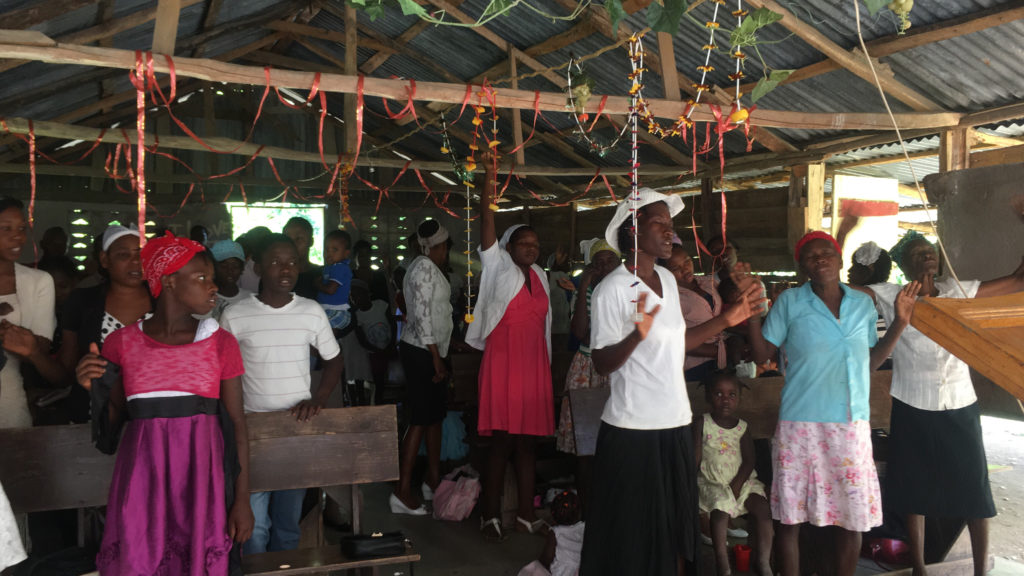
Transforming Communities
The 60 churches in our church network gauge their communities' greatest needs. The people in those churches then become the means to meet those needs. Thanks to help from our brothers and sisters in other countries, GVCM can support the cost of operating local churches, assist them with building new buildings, and invest in their spiritual growth.
You can be part of what God is doing through His Church in Haiti by giving today!
You can be part of what God is doing through His Church in Haiti by giving today!
What are GVCM Churches Doing?
GVCM churches are teaching their congregations to rise above destructive stalemates. Sometimes, common practice encourages people in Haiti to wait for help, and if that fails, to demand help. The church counters with a simple message: work hard with what God has given you and use it to help the people around you.
The church provides avenues to work and serve. Nearly all our churches take up a monthly offering for the elderly people in their congregation. Members who don’t have money can bring food instead. The church is the only social safety net that these older people have. Church members will also aid each other in farming co-ops. They will work as a group of 5-10 to plant or harvest one person’s crop, then they rotate through each member’s fields.
Churches also provide opportunities for children to attend school, and for those who cannot afford the fees (as low as $15 a year), churches typically allow families to work off the fees in the church gardens. On top of all that, churches also host reading clinics for adults.
Our church superintendent, Haitian Pastor Gethro Sannon, provides us with an inside look at what his church and scores of other GVCM churches are teaching their congregations: "The Haitian president cannot solve our problems, no matter who he is. I teach my people that we have to start working to help ourselves and the people around us.” Haitian culture discourages the unemployed from accepting jobs that are beneath their social status. Pastor Gethro counters, “There are no bad professions, just laziness.” He says, “in each season, I teach my young people that they have to plant something. When they earn money, they should save some, and use some to buy seeds, so they can have food not only for today but for tomorrow. I teach them that they will not get a good job unless they first get a good education. I teach them to pay their taxes, because unless they pay them, how will the government have any money to make things better?”
Pastor Gethro quotes a Creole proverb “monte sou bwa kwochi, pou ou ka monte bwa dwat.” A rough translation is, “first climb on the bent tree, and then you can reach the tall tree.” As he explains it, this proverb means that sometimes to improve your situation, you may have to use an unattractive route. He would tell a young person to apprentice as a mechanic for free so that the person can learn the trade and eventually make money doing it. This is a much better approach than waiting around for someone to hand you a mechanic shop to run.
We invest in the church because the church is transforming lives.
The church provides avenues to work and serve. Nearly all our churches take up a monthly offering for the elderly people in their congregation. Members who don’t have money can bring food instead. The church is the only social safety net that these older people have. Church members will also aid each other in farming co-ops. They will work as a group of 5-10 to plant or harvest one person’s crop, then they rotate through each member’s fields.
Churches also provide opportunities for children to attend school, and for those who cannot afford the fees (as low as $15 a year), churches typically allow families to work off the fees in the church gardens. On top of all that, churches also host reading clinics for adults.
Our church superintendent, Haitian Pastor Gethro Sannon, provides us with an inside look at what his church and scores of other GVCM churches are teaching their congregations: "The Haitian president cannot solve our problems, no matter who he is. I teach my people that we have to start working to help ourselves and the people around us.” Haitian culture discourages the unemployed from accepting jobs that are beneath their social status. Pastor Gethro counters, “There are no bad professions, just laziness.” He says, “in each season, I teach my young people that they have to plant something. When they earn money, they should save some, and use some to buy seeds, so they can have food not only for today but for tomorrow. I teach them that they will not get a good job unless they first get a good education. I teach them to pay their taxes, because unless they pay them, how will the government have any money to make things better?”
Pastor Gethro quotes a Creole proverb “monte sou bwa kwochi, pou ou ka monte bwa dwat.” A rough translation is, “first climb on the bent tree, and then you can reach the tall tree.” As he explains it, this proverb means that sometimes to improve your situation, you may have to use an unattractive route. He would tell a young person to apprentice as a mechanic for free so that the person can learn the trade and eventually make money doing it. This is a much better approach than waiting around for someone to hand you a mechanic shop to run.
We invest in the church because the church is transforming lives.

